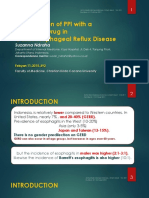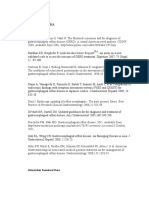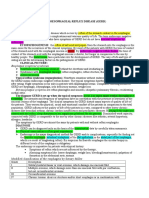Gerd
Uploaded by
Shahnaz RizkaGerd
Uploaded by
Shahnaz RizkaThe Indonesian Journal of Gastroenterology, Hepatology, and digestive Endoscopy Volume 11, Number 2, August 2010
ORIGINAL ARTICLE
Frequency Scale for the Symptoms of GERD Score for Gastroesophageal Reflux Disease in Koja Hospital
Suzanna Ndraha
Department of Internal Medicine, Koja Hospital, Jakarta
ABSTRACT
Background: The frequency scale for the symptoms of GERD (FSSG) was a specific questionnaire to gastroesophageal reflux disease (GERD), which has been validated against the endoscopic findings in Japan. The high score FSSG is one of the factors related to failure of proton pump inhibitor (PPI) mono therapy. The purpose of this study is to determine FSSG score in patients with GERD at Koja hospital, in order to predict the need for combination therapy of PPI with prokinetic drug or PPI only. Method: Dyspeptic patients which had have heartburn and/or regurgitation were collected in the period of March until July 2010. The FSSG score was obtain containing 12 questions which consisted of seven questions for reflux symptoms and five questions for dysmotility/dyspeptic symptoms. Results: There were 129 patients, 51 (39.5%) males and 78 (60.5%) females, mostly in the age group of < 40 years (55.8%), body mass index of most patients (66.6%) were normal, only 12.4% were overweight. FSSG score revealed the mean of total score of 17.6 6.9. From 129 dyspepsia patients who complained heartburn and or regurgitation, obtained 121 (94%) met criteria for GERD with cutoff eight. The mean of reflux score was 7.4 4.6 while the mean of dyspeptic/dysmotility score was 10.1 4. Thus from 129 patients studied, the symptoms of dyspeptic/dysmotility more dominant than symptoms of reflux Conclusion: GERD patients in Koja hospital have a high mean FSSG score, whereas dysmotility symptoms was proved to be more dominant than acid reflux Keywords: GERD, FSSG, dyspeptic/dysmotility score, reflux score
You might also like
- Combination of PPI With A Prokinetic Drug in Gastroesophageal Reflux DiseaseNo ratings yetCombination of PPI With A Prokinetic Drug in Gastroesophageal Reflux Disease4 pages
- Combination of PPI With A Prokinetic Drug in Gastroesophageal Reflux DiseaseNo ratings yetCombination of PPI With A Prokinetic Drug in Gastroesophageal Reflux Disease19 pages
- The Use of Frequency Scale For The Symptoms of GERD in Assessment of Gastro-Oesophageal Re Ex Symptoms in AsthmaNo ratings yetThe Use of Frequency Scale For The Symptoms of GERD in Assessment of Gastro-Oesophageal Re Ex Symptoms in Asthma5 pages
- Complementary and Alternative Medical Lab Testing Part 5: GastrointestinalFrom EverandComplementary and Alternative Medical Lab Testing Part 5: GastrointestinalNo ratings yet
- Functional (Non-Ulcer) Dyspepsia and Gastroesophageal Refl Ux Disease: One Not Two Diseases ?No ratings yetFunctional (Non-Ulcer) Dyspepsia and Gastroesophageal Refl Ux Disease: One Not Two Diseases ?3 pages
- Daftar Pustaka: Universitas Sumatera UtaraNo ratings yetDaftar Pustaka: Universitas Sumatera Utara3 pages
- Reflux Symptoms in Patients With Gastroparesis .1220No ratings yetReflux Symptoms in Patients With Gastroparesis .12201 page
- Clinical Pictures & Predisposition Factors in Patients With Erosive and Non Erosive Gastroesophageal Reflux DiseaseNo ratings yetClinical Pictures & Predisposition Factors in Patients With Erosive and Non Erosive Gastroesophageal Reflux Disease21 pages
- Prevalence of Gastro-Oesophageal Reflux Disease, and Its Associated Risk Factors Among Medical Students: A Nation-Based Cross-Sectional StudyNo ratings yetPrevalence of Gastro-Oesophageal Reflux Disease, and Its Associated Risk Factors Among Medical Students: A Nation-Based Cross-Sectional Study7 pages
- Quit Smoking Improves Gastroesophageal Reflux Symptoms and Quality of LifeNo ratings yetQuit Smoking Improves Gastroesophageal Reflux Symptoms and Quality of Life7 pages
- Diagnosis and Management of Functional HeartburnNo ratings yetDiagnosis and Management of Functional Heartburn9 pages
- Role of Acid and Weakly Acidic Reflux in Gastroesophageal Reflux Disease Off Proton Pump Inhibitor TherapyNo ratings yetRole of Acid and Weakly Acidic Reflux in Gastroesophageal Reflux Disease Off Proton Pump Inhibitor Therapy7 pages
- Complementary and Alternative Medical Lab Testing Part 9: GynecologyFrom EverandComplementary and Alternative Medical Lab Testing Part 9: GynecologyNo ratings yet
- Complementary and Alternative Medical Lab Testing Part 10: ObstetricsFrom EverandComplementary and Alternative Medical Lab Testing Part 10: ObstetricsNo ratings yet
- New_Perspectives_in_Endoscopic_Treatment_of_Gastroesophageal_RefluxNo ratings yetNew_Perspectives_in_Endoscopic_Treatment_of_Gastroesophageal_Reflux17 pages
- Complementary and Alternative Medical Lab Testing Part 6: Liver and GallbladderFrom EverandComplementary and Alternative Medical Lab Testing Part 6: Liver and GallbladderNo ratings yet
- Diagnosis and Management of Refractory Gastroesophageal Reflux Disease - PMCNo ratings yetDiagnosis and Management of Refractory Gastroesophageal Reflux Disease - PMC43 pages
- Evaluation of GERD Diagnosis, Management, and OutcomesNo ratings yetEvaluation of GERD Diagnosis, Management, and Outcomes8 pages
- Complementary and Alternative Medical Lab Testing Part 18: PsychiatryFrom EverandComplementary and Alternative Medical Lab Testing Part 18: Psychiatry5/5 (1)
- Refractory Gastroesophageal Reflux Disease Diagnosis and ManagementNo ratings yetRefractory Gastroesophageal Reflux Disease Diagnosis and Management12 pages
- Lifestyle Factors Affecting Gastroesophageal Re Ux Disease Symptoms: A Cross-Sectional Study of Healthy 19864 Adults Using FSSG ScoresNo ratings yetLifestyle Factors Affecting Gastroesophageal Re Ux Disease Symptoms: A Cross-Sectional Study of Healthy 19864 Adults Using FSSG Scores12 pages
- The Los Angeles Classification of Gastroesophageal Re Ux DiseaseNo ratings yetThe Los Angeles Classification of Gastroesophageal Re Ux Disease2 pages































































